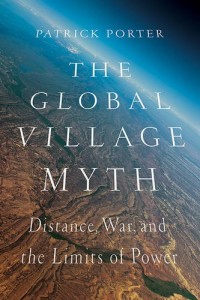
The Global Village Myth: Distance, War, and the Limits of Power
By Patrick Porter Washington, DC: Georgetown University Press, 2015
Reviewed by Steven Metz, Director of Research at the US Army War College
The Global Village Myth is short, tightly-argued body blow to contemporary American security policy. In it Patrick Porter takes on an important but often overlooked aspect of strategy-physical distance- and critiques the popular notion that technology has diminished its importance or even rendered it irrelevant. This is a seemingly simple idea with big implications.
Porter believes underestimating the importance of physical distance has an insidious effect on American strategy by stoking what he calls “globalism.” This idea emphasizes the intricate connectivity of the world today and concludes this gives the United States a stake in stability and security everywhere. Americans fear “enemies from afar could force a sleeping America into a fight,” and thus must be defeated while still distant. (90) As President George W. Bush expressed it, “We will fight them over there so we do not have to face them in the United States of America.”1
Globalists, as Porter puts it, “perceive a transformed, dangerous environment, a shrinking world where technology trumps terrain, where the offense has advantages, where America's security interests are virtually limitless and on which American power can be imposed, if only its leaders had the will. An imperial and restless ideology, globalism is a potential force for belligerence as well as cosmopolitanism.” (216)
Although globalism in some way shaped American strategy for a century, September 11 gave it a huge boost and temporarily quelled its opponents. The American public and its elected leaders came to believe their security “rested on the security of others” and this made even remote dangers intolerable. Insecurity could-and would-spread, The only logical response from this perspective was to embrace “the projection of power far beyond its hemisphere with no obvious limit, and tame the world back into order.” (216-217) America, in other words, was “both uniquely threatened and uniquely powerful.” (113)
Porter believes the globalist position vastly overstates the extent to which conflict and threats around the world are connected, and underestimates the extent to which physical distance still matters. He demonstrates his position with three case studies: “netwar”-the idea that technology and connectivity empower weak organizations like al Qaeda against traditionally strong ones like the United States- amphibious invasions operations using a hypothetical Chinese invasion of Taiwan, and the combination of cyber warfare and drones.
Porter's argument matters greatly to Army strategists and strategic leaders. “Deterritorializing” the concept of security, he writes, “has led to the neglect of limits, an insensitivity to strategic costs, a boundless conception of interests, and the pursuit of absolute security at almost any price.” (217) As a result, policymakers overestimate the ability of the American military to impose its will on adversaries. The burden of this chronic miscalculation falls heavily on the Army since committing it makes disengagement politically difficult. This difficulty can lead policymakers to “double down” on failed operations or those whose cost exceeds their benefits rather than writing offthe effort. Think Afghanistan today.
Porter also argues the further military force is projected, the more elusive success becomes because advantage shifts to defenders. “In the unending cycle of offense versus defense,” he argues, “the military-strategic balance for some time may favor weapon systems used skillfully for defensive purposes against would-be expansionists.” (155) The observation that projecting military power long distances lowers the chances of strategic success affects the Army directly, particularly in a time when the qualitative advantage of the US military over potential opponents is shrinking as technology disperses and the size of the American armed forces shrinks.
Porter's assessment leads him to advocate a more restrained security strategy, particularly when considering the use of military force. The United States should “proceed on the basis that it can place limits on threats, curtail adversaries' ability to operate, and wait patiently for them to wither into an irrelevance or nuisance.” (224) Like other authors, such as Andrew Bacevich and Christopher Preble, Porter believes, “we are less powerful, but more secure than we think.” (224) That is a vitally important idea: if his assessment is accurate and if American political leaders accept it, the case for robust, expeditionary landpower weakens. The logical shape for the US Army would be something like the pre- World War II model of a small, professional force capable of modest expeditionary operations and of supporting partners; reserves would be on call for major war or those entities posing a direct rather than an indirect or theoretical threat to the United States.
This position is at odds with the thinking of the Army's current leaders. But Porter's assessment deserves and demands serious consideration by them: unlike calls for dramatic cuts to the Army which are motivated more by inter-service rivalry, his is based on a cold and penetrating assessment of the global security environment. The argument may or may not be right, but it must be understood by the architects of the future US military.
1 President Bush Addresses the 89th Annual National Convention of the American Legion, Reno, Nevada, August 28, 2007.



